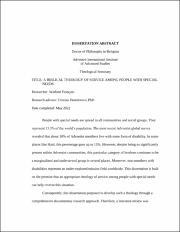| dc.description.abstract | People with special needs are spread in all communities and social groups. They represent 15.3% of the world’s population. The most recent Adventist global survey revealed that about 10% of Adventist members live with some form of disability. In some places like Haiti, this percentage goes up to 15%. However, despite being so significantly present within Adventist communities, this particular category of brethren continues to be a marginalized and underserved group in several places. Moreover, non-members with disabilities represent an under-explored mission field worldwide. This dissertation is built on the premise that an appropriate theology of service among people with special needs can help reverse this situation.
Consequently, this dissertation purposed to develop such a theology through a comprehensive documentary research approach. Therefore, a literature review was
carried out and revealed the existence of a few disability-related and service-related theologies. This review also showed how the Adventist Church has been responding to disability so far.
However, the assessment of these existing related theologies demonstrated that several aspects of a holistic service to their targeted group were left unaddressed. In addition, these theologies do not suggest strategies or models for their application. This theological gap partially explained why the Adventist Church is yet to respond adequately to disability in several places and confirmed the need for a more specific theology aiming to foster a holistic service to people with special needs. Consequently, a 6-passage analysis series was conducted to discover biblical principles that would inform this much needed theology.
In the last chapter of this dissertation, the findings of the series of passage analyses are arranged into a Christ-centered model for holistic service among people with special needs. This model shows how an appropriate theology of service can enable a holistic service among those with special needs through 6 biblical principles: the consciousness of Christ’s covenant of grace, the intentionality and protection for people with special needs, the balanced Christ-centered view of disability, the holistic embrace of people with special needs, the enabling of self-determination, and the authentic worship to Christ through His disabled children. Lastly, some recommendations are offered to make the Adventist Church more inclusive. These findings are also applicable to other denominations. | en_US |

